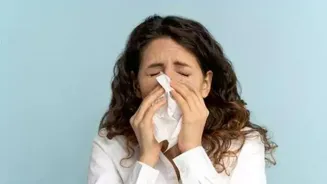Monsoon breezes, not sneezes: your allergy defense plan
August may bring a break from scorching summer heat, but it also signals the peak season for allergies
in various parts of India. Between monsoon humidity, blooming plants, mold growth, and rising dust mites, the air is full of invisible triggers. For those prone to seasonal allergies, this means sneezing fits, watery eyes, stuffy nose, and associated headache.
Common August allergy triggers in India include:

- Pollen from blooming plants like parthenium and ragweed
- Dust mites thriving in humid weather
- Mold spores from damp corners during monsoon
- Air pollution mixing with moisture to irritate the lungs
Recognizing the Early Signs of Seasonal Allergies
Sensing symptoms early can make a huge difference in managing them. If you notice these signs, it’s time to act:
- Persistent sneezing, especially in the morning
- Watery, itchy, or red eyes
- Nasal congestion and runny nose
- Scratchy throat or mild cough
- Sudden fatigue after being outdoors
Pro Tip: We often mistake allergy symptoms for a common cold. However, allergies don’t cause fever and usually persist as long as you’re exposed to the trigger.
Your Allergy Defense Strategy for August

Know Your Triggers and Track Them
Just like checking the weather or AQI, tracking pollen and humidity levels can help you plan your day. Several Indian weather apps now include pollen count forecasts. If counts are high, stay indoors in the morning, when pollen levels peak.
Create an Indoor Safe Zone
Since pollen and dust easily sneak indoors, your home should be your allergy-free haven.
- Keep windows closed during high pollen hours.
- Use air purifiers with HEPA filters to trap allergens.
- Wash bedding in hot water weekly to kill dust mites.
- Keep damp areas dry to prevent mold growth.
- Keep an effective air purifier handy.
Practice Allergen Hygiene
The little things add up when it comes to allergy prevention:
- Change clothes immediately after coming indoors.
- Shower before bed to wash off pollen and dust.
- Wear sunglasses outdoors to protect your eyes from airborne irritants.

Boost Your Body’s Natural Defenses
A healthy immune system reduce the severity of allergic reactions. Include Vitamin C-rich foods like oranges, guava, and amla in your diet. Turmeric milk, a popular Indian remedy, contains curcumin, known for its anti-inflammatory properties.
Keep Medications Handy
If you’re allergy-prone, consult your doctor about antihistamines or nasal sprays beforehand. Starting preventive medication early can keep symptoms under control.
Natural Remedies to Try (But With Caution)
India’s traditional remedies have stood the test of time, but always check with your doctor before trying something new:
- Steam inhalation with eucalyptus oil to ease congestion
- Saline nasal rinse to flush out allergens
- Tulsi (Holy Basil) tea for soothing sore throats and boosting immunity

When to Seek Medical Help
If symptoms worsen or you experience wheezing, shortness of breath, or swelling, immediately seek professional care. Seasonal allergies can sometimes trigger asthma attacks or sinus infections.
August allergies may be a seasonal nuisance, but with the right precautions, you can enjoy monsoon’s beauty without the sniffles. The key is prevention, early action, and maintaining a healthy lifestyle.















